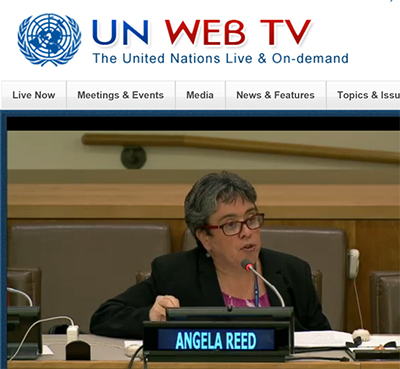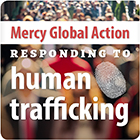Angela Reed rsm Presents Progressive Framework for Human Trafficking Prevention at UN Event
July 30, 2016
|
On 13 July 13 at the UN Headquarters in New York, Angela Reed rsm was a panel representative for the Sisters of Mercy, Mercy Global Action and Australian Catholic Religious Against Trafficking in Humans (ACRATH). She joined a distinguished line up of speakers reflecting upon the grave realities of human trafficking in children and youth. The panel focused on strategies for shaping a world in which trafficking does not exist.
Sr Angela, brings expertise to the issue of human trafficking, having conducted her PhD research on the use of the “life course” perspective to understand and address the trafficking of women for sexual exploitation in the Philippines. Angela also spent seven years as the director of Mercy Care, a safe house in Melbourne, Australia for women and children who have experienced violence. Watch the UN Webcast of the event here. Sr Angela begins her discussion in the 38th minute of the recording. Panel speakers from a wide range of perspectives reflected on the following topics: Sr Angela spoke to the causes of child trafficking and remedies, with a focus on the importance of giving voice to victims of trafficking and learning from those who have been exploited. Consistent with her research and previous advocacy efforts at the UN, she called for the crafting of anti-trafficking policies to be rooted in real life experiences of those who have been trafficked and aimed toward the elimination of factors that render youth and children vulnerable to exploitation and trafficking. She divided her remarks into four interrelated sections: challenging the dominant discourse on trafficking, using a 'life course' lens to understand conditions that render people vulnerable to trafficking, presenting a framework to prevent trafficking, and making recommendations based on the preventative framework. In the first half of her talk, Angela spoke about human trafficking as 'first and foremost, a human rights violation'. She contested popular discourse on human trafficking that often frames exploitation as 'a random act of victimization'. Instead of this sensationalized and largely inaccurate depiction of trafficking, Angela highlighted her research showing trafficking to be 'far more systemic and sinister […] through a more systemic process of victimization' that results from layers of human rights violations throughout a person’s life, rendering an individual vulnerable to trafficking. Sr Angela then described a preventative framework for addressing human trafficking, which she calls 'a long term trafficking prevention mechanism seeking to realize the human dignity of all'. Drawing on her participatory research on trafficking and her experience in the realm of global policy making, Angela looked to her findings on the particular human rights violations that render people vulnerable to trafficking. From there, she developed a truly remarkable framework of 'Optimal Life Course Conditions' to prevent trafficking. In other words, her framework lays out the human rights and life conditions for individuals that must be fulfilled if the risk of being trafficked is to decrease or be eliminated entirely. There are 17 such 'Optimal Conditions' throughout one’s life, which Angela stressed are 'grounded in a rights-based, life course and gendered approach, and when integrated, are intended to counter vulnerabilities to trafficking'. Six of the 17 life course conditions specifically relate to child trafficking. Sr Angela described these to be: an adequate standard of living; human attachment and belonging; quality education; safety, security and emotional wellbeing; social and community connectedness; and gender equality. Sr Angela explained each of these six life course conditions particularly relevant for tackling vulnerability of youth and children to trafficking by weaving in testimony from victim-survivors interviewed in her research. In describing the life course condition of an adequate standard of living, she quoted a formerly trafficked woman referred to as Riza, stressing, 'All I know is that I was malnourished when I was still a child because of inadequate care due to poverty. During school days, food was so scarce on our table, if we had rice sometimes we did not have soup to go with it'. In reference to gender equality, another condition that must be fulfilled over the life course in order to decrease vulnerability to trafficking, Sr Angela quoted a victim-survivor named Lanie, stating, 'Around the age of nine in school and in the community, I was already tagged as a girl who wants sex'. Sr Angela recounted Lanie’s experience of feeling 'different from other little girls', as a person who did not live up to what was expected culturally of her gender. Angela highlighted gender subordination as a root cause of vulnerability to trafficking.
Sr Angela has contributed her unique perspective to discussions on human trafficking at the UN in several different forums. See links here, here, and here. She will continue to utilize UN spaces to advocate for our global leaders to utilize the life course perspective and concrete policy objections drawn from the 'optimal life course conditions' preventative framework to effectively eliminate the systemic human rights violations that render people vulnerable to human trafficking. Messages to: Angela Reed rsm - Resident, Mercy Global Action |

 The Permanent Observer Mission of the Holy See, the NGO Committee to Stop Trafficking in Persons, Salesian Missions, the Greek Orthodox Archdiocese of America, and ECPAT-USA sponsored the event,
The Permanent Observer Mission of the Holy See, the NGO Committee to Stop Trafficking in Persons, Salesian Missions, the Greek Orthodox Archdiocese of America, and ECPAT-USA sponsored the event, 
